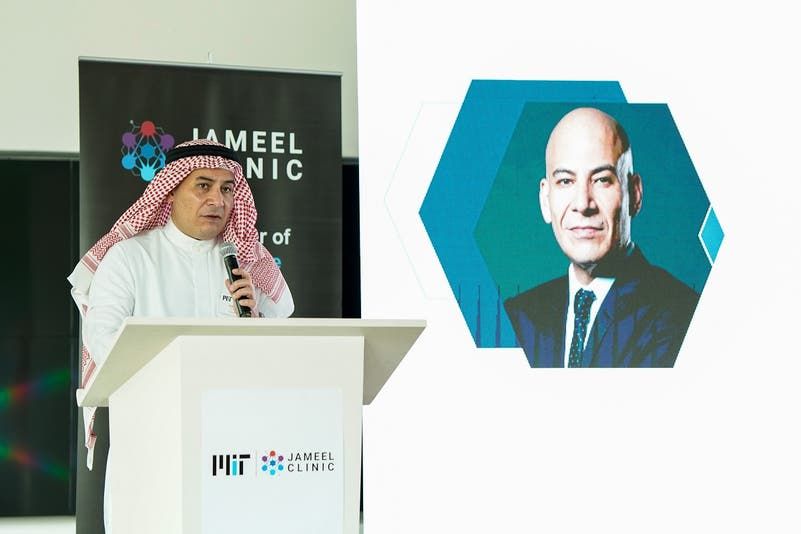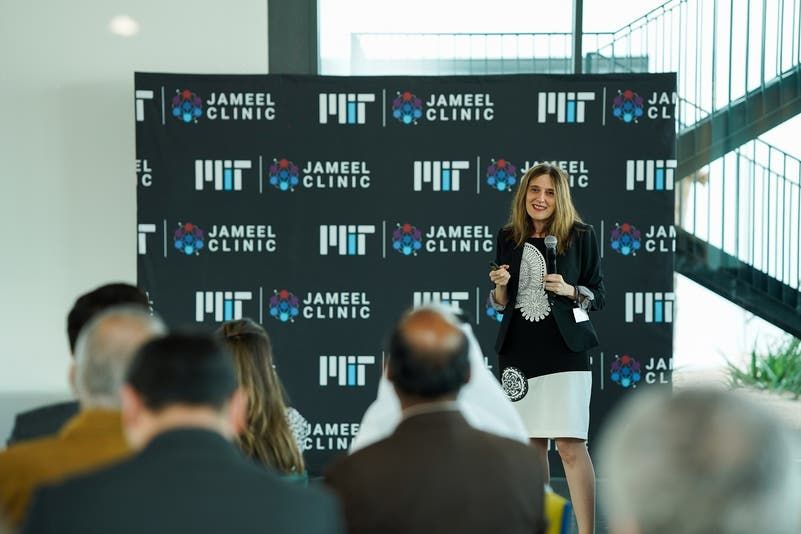
MIT Jameel Clinic hosts meet on AI and healthcare, to roll out clinical tools
Held at the Jameel Arts Centre in Dubai with Omar Sultan Al Olama, UAE Minister for Artificial Intelligence, Digital Economy and Remote Work Applications, in attendance, the conference brought together pioneers in AI and health from the Jameel Clinic, including MacArthur's genius grant’ Fellows Professor Regina Barzilay and Professor Dina Katabi, Dr Adam Yala, and Dr Shrooq Alsenan, a Jameel Clinic research fellow from Saudi Arabia, together with representatives from major hospitals and public health agencies across the Middle East, North Africa, and South Asia (MENASA) region.
The conference marks the first international venture of ‘AI Cures,’ the Jameel Clinic’s platform for collaboration that launched in the early months of the COVID-19 pandemic.
 Omar Sultan Al Olama, UAE Minister for Artificial Intelligence, Digital Economy and Remote Work Applications.
Omar Sultan Al Olama, UAE Minister for Artificial Intelligence, Digital Economy and Remote Work Applications.
 Fady Jameel, Vice Chairman, Community Jameel, speaking at 'AI Cures' conference held in Dubai.
Fady Jameel, Vice Chairman, Community Jameel, speaking at 'AI Cures' conference held in Dubai.
The Jameel Clinic, co-founded by MIT and Community Jameel in 2018, brings together computer scientists, biologist,s and clinicians to develop new tools to tackle health challenges. Since its launch, the Jameel Clinic team has used deep learning techniques to discover Halicin, the first new antibiotic in three decades, which is capable of killing around 35 deadly bacteria, including antimicrobial-resistant tuberculosis and the superbug C. difficile.
The Jameel Clinic also developed Mirai, a machine learning algorithm that predicts breast cancer more than three years earlier than current approaches and is equally effective across different races and ethnicities, a major advance for health equity.
Consistent with the Jameel Clinic’s mission to ensure these new tools are rolled out around the world, especially to countries with more fragile public health systems and to at-risk communities, the ‘AI Cures’ MENASA conference will serve as a launch pad for the international expansion of the Jameel Clinic AI Hospital Network, a new initiative supported by the Jameel Clinic and Wellcome that is building partnerships with hospitals to deploy and develop new AI tools in clinical settings, with the aim of saving lives.
Fady Jameel, vice chairman of Community Jameel, said: “We are excited to be able to help bring together such an inspiring gathering of scientists, policymakers, public health officials and hospital leaders at the Jameel Arts Centre in Dubai. The work of the Jameel Clinic has the potential to transform healthcare for millions of people around the world, and we are excited to see the Jameel Clinic AI Hospital Network expanding in the MENASA region and rolling out clinical AI tools around the world for equitable impact for all.”
Professor Regina Barzilay, AI faculty lead at the Jameel Clinic, said: “Ensuring that the cutting-edge clinical AI research being done at MIT can be utilized in diverse clinical settings is critical to our mission at the Jameel Clinic. We look forward to combining the expertise of Jameel Clinic researchers with the expertise of local clinicians and public health officials in the MENASA region to maximize the impact of clinical AI tools on patient lives.”
 Regina Barzilay AI Faculty Lead, MIT Jameel Clinic.
Regina Barzilay AI Faculty Lead, MIT Jameel Clinic.
In comments to Al Arabiya English, those attending made further comments.
Professor Barzilay said: With machine learning, we have the capacity to bring about truly transformative change in healthcare and that can only happen if we effectively deploy machine learning models in real-world settings, into hospitals and medical centers with clinicians and patients. Building a robust coalition of researchers, clinicians, hospitals, and public health actors is critical to realizing the benefits of major advances in machine learning in the detection and treatment of diseases.”
Tariq Khokhar, head of data for science & health at Wellcome, said: “AI tools have an exciting role to play in transforming healthcare for patients around the world and advancing health research. But first, researchers, policymakers, clinicians, and healthcare managers must work together to rigorously test them in diverse settings, so we know they work for different people and under different circumstances. This will ensure they are safe for everyone and maximize their potentially life-saving potential.”
Professor Dina Katabi, principal investigator at the MIT Jameel Clinic, said: “At the conference, we spoke about how we can use artificial intelligence in the future of the healthcare sector and improve it. We researched that AI assessment of Parkinson's can be done every night at home while the person is asleep and without touching their body. To do so, the team developed a device that has the appearance of a home Wi-Fi router, but instead of providing internet access, the device emits radio signals to analyse their reflections off the surrounding environment, and extract the subject’s breathing patterns without any bodily contact. The breathing signal is then fed to the neural network to assess Parkinson’s passively, and there is zero effort needed from the patient and caregiver.”
“A relationship between Parkinson’s and breathing was noted as early as 1817, in the work of Dr. James Parkinson. This motivated us to consider the potential of detecting the disease from one’s breathing without looking at movements,” Katabi says. “Some medical studies have shown that respiratory symptoms manifest years before motor symptoms, meaning that breathing attributes could be promising for risk assessment before the diagnosis of Parkinson’s.”
“The fastest-growing neurological disease in the world, Parkinson’s is the second-most common neurological disorder, after Alzheimer's. In the United States alone, it afflicts over 1 million people and has an annual economic burden of $51.9 billion. The research team’s algorithm was tested on 7,687 individuals, including 757 Parkinson’s patients.”
This research was performed in collaboration with the University of Rochester, Mayo Clinic, and Massachusetts General Hospital, and is sponsored by the National Institutes of Health, with partial support by the National Science Foundation and the Michael J. Fox Foundation.
Dr. Mohammad AlHamid, Director of the Centre for Healthcare Intelligence (CHI) at King Faisal Specialist Hospital & Research Centre (KFSH&RC), said: It’s great to be here at this seminar, we created the intelligence center back in 2019 , and we work with clinical and operational leaders to build and deploy high-quality applied Healthcare Artificial Intelligence (AI) solutions for enhancing quality of care, streamlining workflow operations, and improving patient experience using best practice operational and responsible AI pipelines.”
The Jameel Clinic AI Hospital Network aims to roll out clinical AI tools at 35 hospitals across eight countries, including Saudi Arabia, India, and Taiwan. With the significant breakthroughs in clinical AI technologies we have witnessed in the past decade across all areas of clinical care, the networks seeks to ensure that new healthcare technologies are deployed equitably, particularly across low and middle-income countries, in order to improve the quality of care and save lives.











